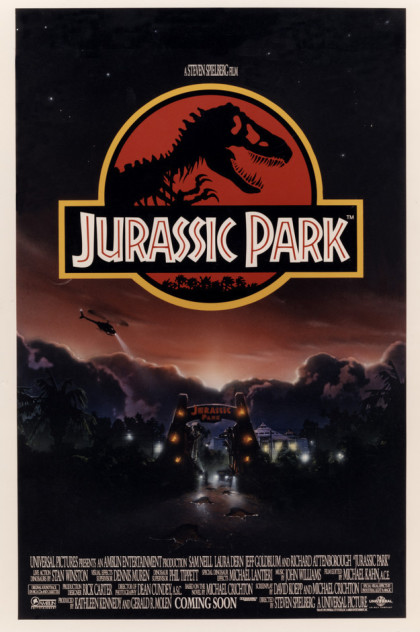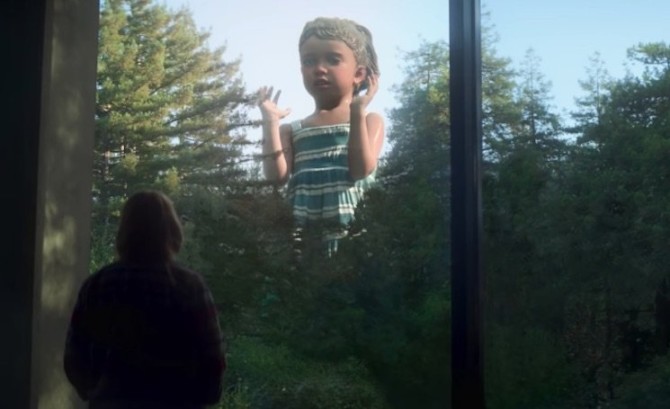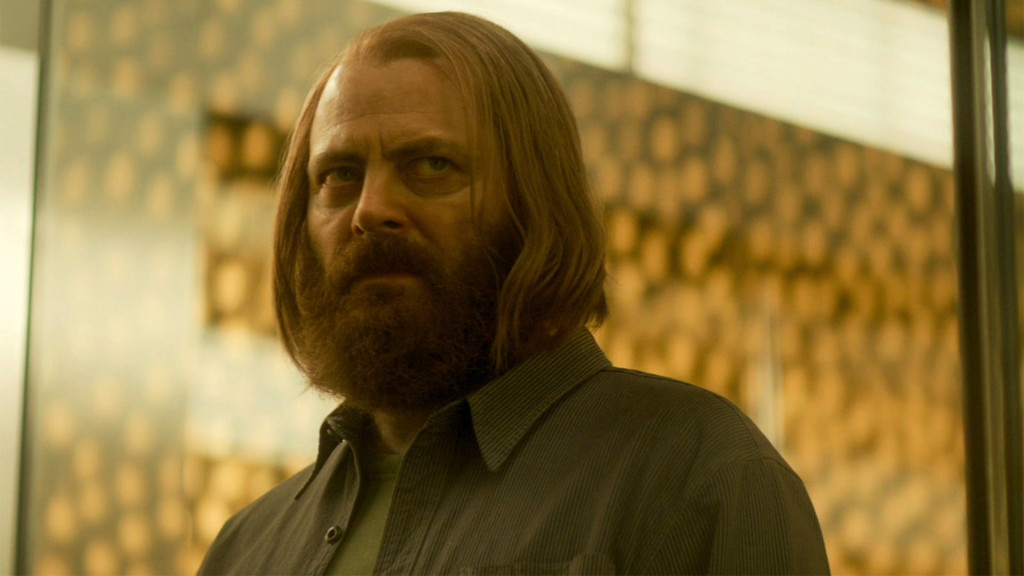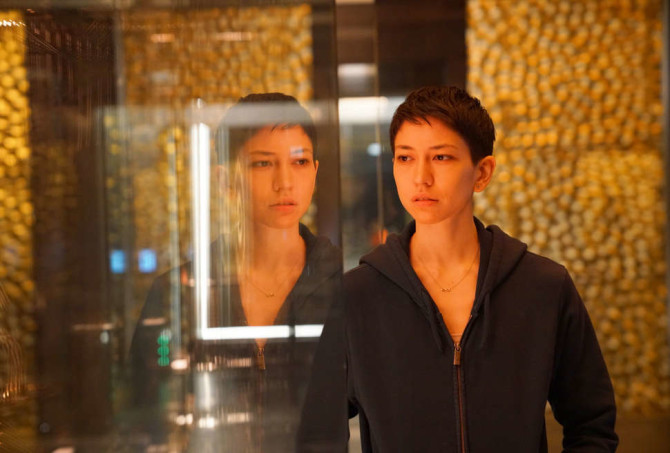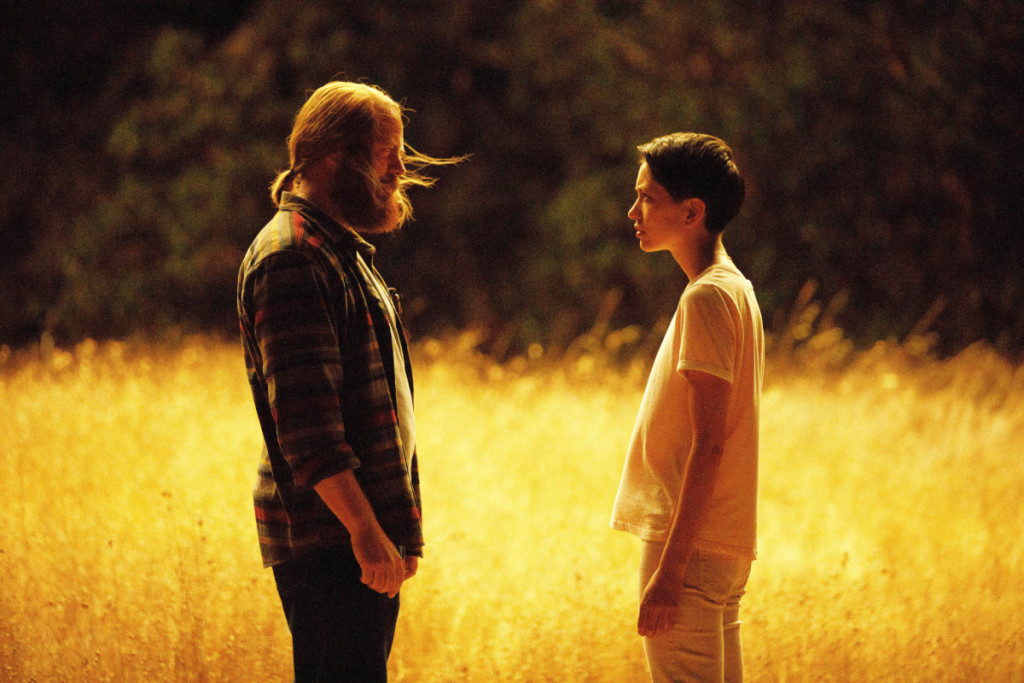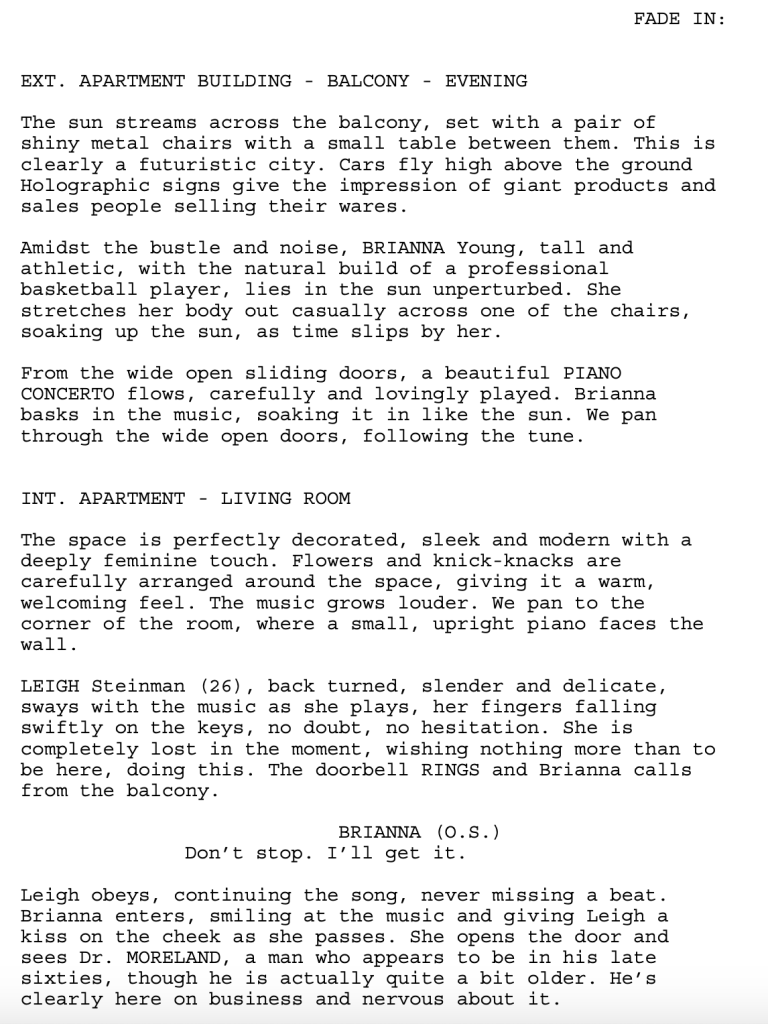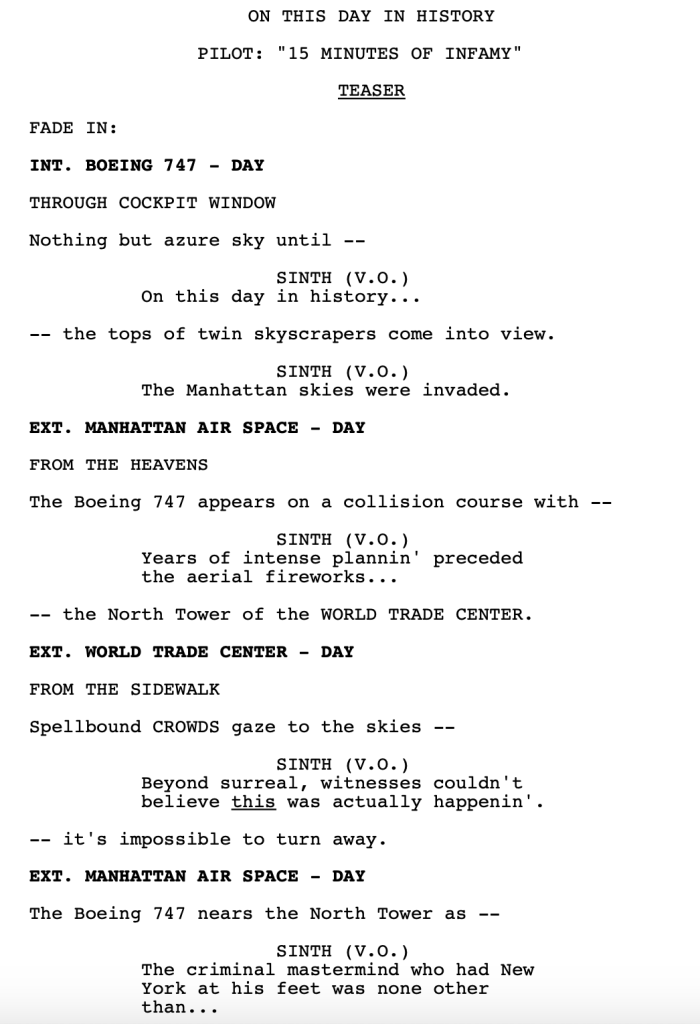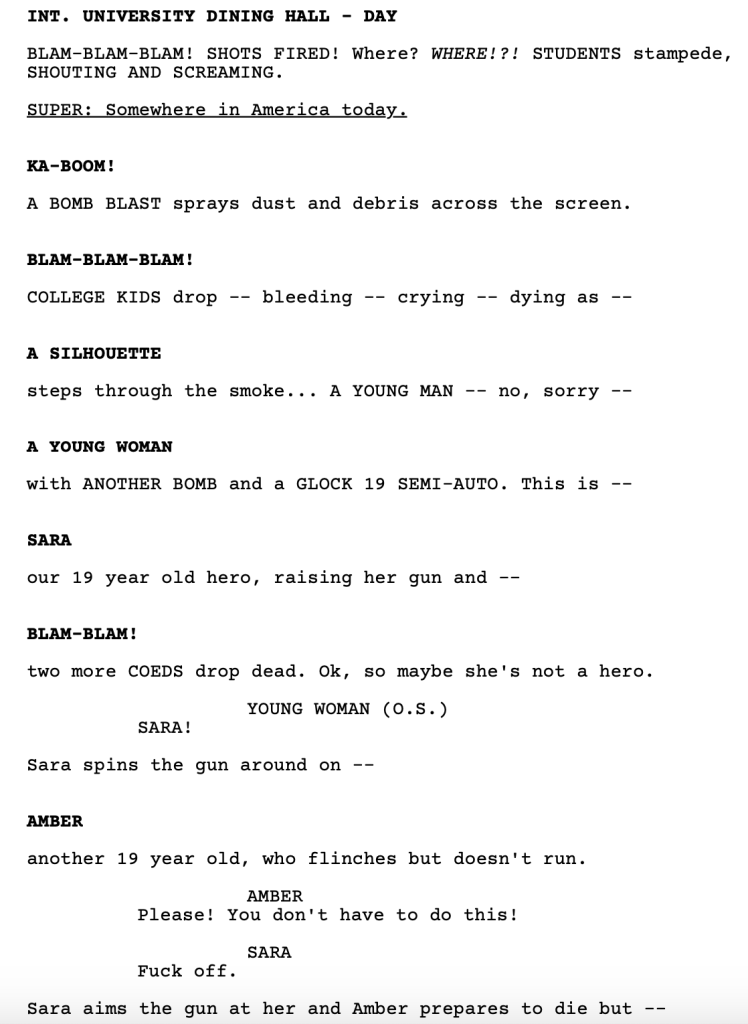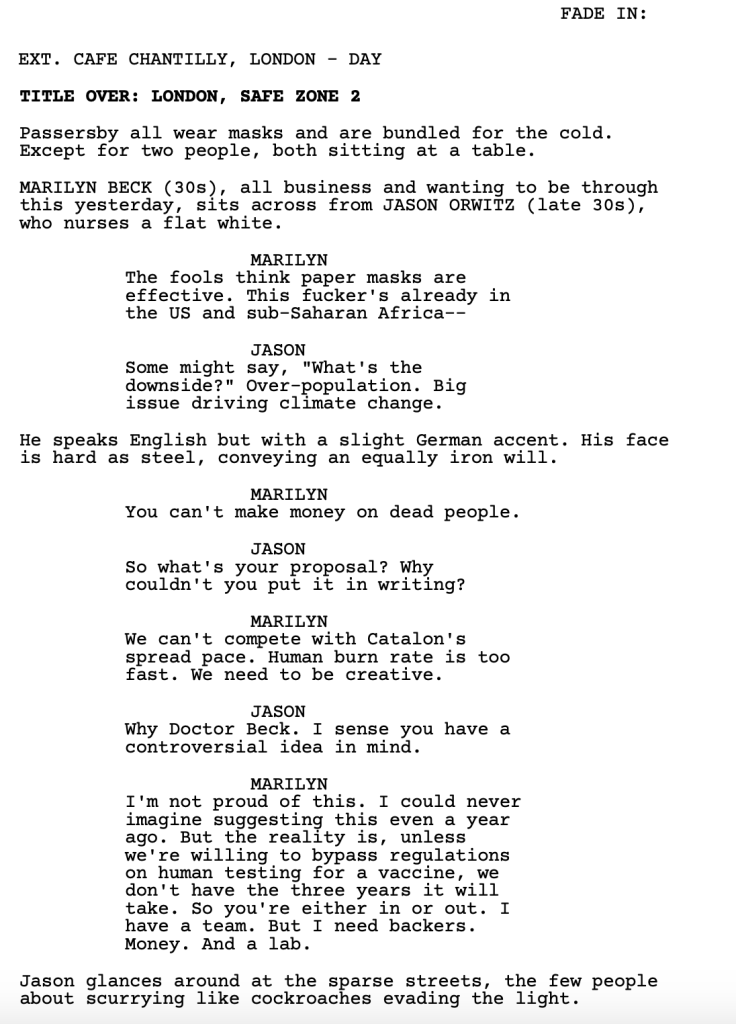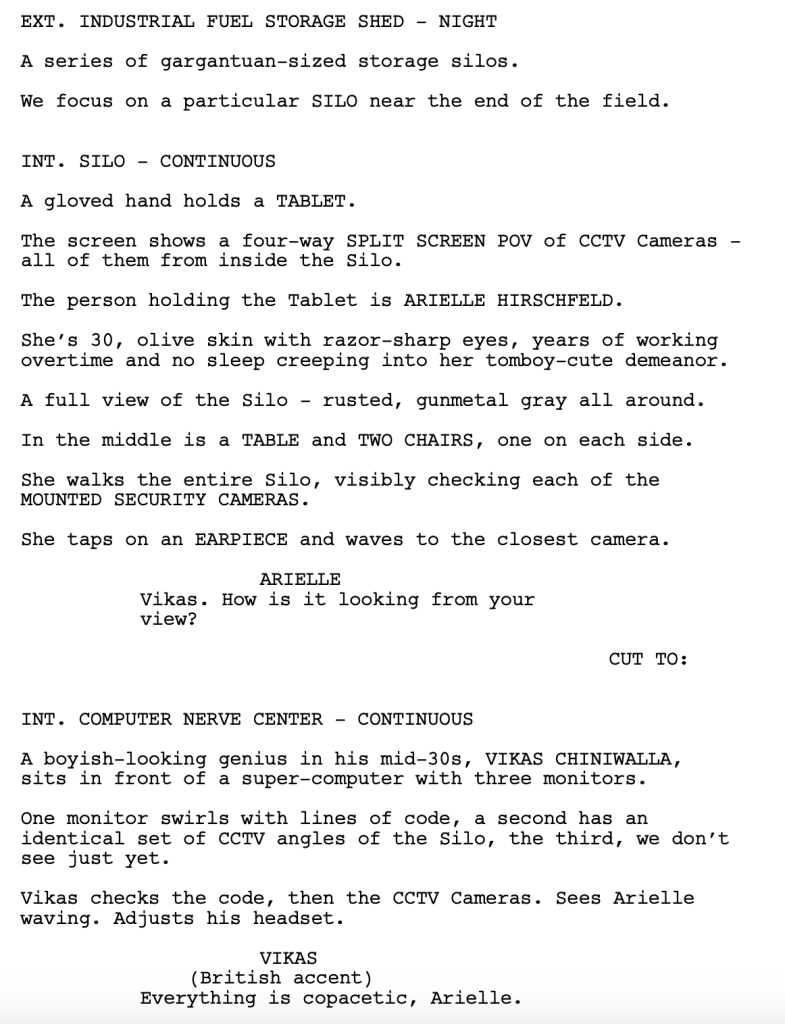Today is Day 2 of Prep to write a screenplay in 2 weeks. You can read the announcement for the 2 Week Screenplay Challenge here.
We’re five days away from FADE IN and we’ve got a ton of work to do. By this time tomorrow, you need to know what script you’re writing.
Yesterday, I told you to prepare 5 loglines for scripts you want to write. Then, either e-mail five friends of yours and ask them to rank the ideas from best to worst. Or post the loglines right here in the comment section and have the Scriptshadow community rank them for you. Whatever gets the most votes, I’d suggest you write that idea.
If you want my personal opinion, my logline service is still cheap. $25 for a rating, a 150 word analysis, and a logline rewrite. I will reintroduce the 5 loglines for $75 deal through the weekend. E-mail me at carsonreeves1@gmail.com if you’re interested.
Like I said yesterday, committing to an idea will be the most important decision you make in this challenge by far. Good ideas inspire exciting stories. Weak ideas are like swimming with cinder blocks tied to your feet. Every scene is a chore. Finding the next plot beat is akin to finding toilet paper at the supermarket.
How do we define a good idea versus a bad one? While it may seem like how good an idea is is in the eye of the beholder, there are things you can do to improve an idea’s potency. A good idea is one that does a lot of the writing for you. Common factors include a strong main character goal, a heavy dose of conflict in the way of your hero’s journey, and the stakes feel big. That’s important – that this story feel like major consequences are involved. If you want to add even more charge to the idea, contain the time frame. Create a sense of urgency (the goal must be achieved soon or else…).
I would also like to introduce a new concept that has a major effect on how appealing your idea is to others. It’s called CREATIVE POTENTIAL and you want your ideas to have it. Sure, you can put a John Wick like character in your lead role and say he has to kill the evil bad guy within 28 hours or his family will be executed. That hits all the beats I mentioned above. But with zero creativity behind the setup, it doesn’t leave a lot of openings to give the story anything people haven’t seen before. Nor does it offer opportunities for surprising plot revelations. It’s a bland straightforward idea that lacks anything to distinguish it from the pack.
So what’s a good idea that contains all these things?
Jurassic Park, duh. I know it’s an oldie, but it’s a goodie. A group of people gets stuck on an island of dinosaurs. Goal = escape. Stakes = their lives. Urgency = they’re being chased so they have to achieve the goal NOW. Conflict = dinosaurs are trying to kill them. Creative Potential = a freaking island of dinosaurs. There are so many fun creative plot things you can do with this setup.
Okay, what about a bad idea? An idea that doesn’t “write itself.”
I’m going to say Marriage Story. I know I just used that as an example yesterday of an easy script to write but now I’m having second thoughts. The idea doesn’t have a goal. It doesn’t have any stakes really. The damage to this couple is already done at the start of the story. The narrative is used to get us to the legal finish line of the divorce. There’s clearly no urgency here. The script’s sole dramatic engine is the conflict between the central characters, which admittedly works well. But because you don’t have any real goal pushing the narrative, coming up with scene ideas for this must have been a nightmare. It’s always easy to see how they got there in the rear-view mirror, but I suspect there were a lot of long nights of Noah Baumbach staring at the blank page not knowing what to write next. Goal-less characters are responsible for driving many a writer insane.
And here’s another good idea…
This one a longtime Scriptshadow reader alerted me to from a previous contest – “It’s Christmas time in Berlin, 1944. A serial murderer is on the loose, and a confounded police detective springs a famed Jewish psychologist from Auschwitz to help him profile and catch the killer.” – The script would go on to sell to Fox. We’ve got our goal – catch the killer. We’ve got stakes – people are dying. We’ve got urgency – the longer it takes to catch him, the more people die. We’ve got some great conflict at the center of the story – A German police officer and a Jewish psychologist working together during one of the most tense times in history. And the creative potential of this idea is off the charts. You know you have a good idea when anybody who reads it can start thinking up fun scenes to write.
Finally, here’s one of Magga’s loglines from yesterday, which I had issues with. I hope Magga is okay with me critiquing it because your other idea, Shalloween, sounds great.
LIVE FOREVER – At the height of the britpop craze, demand for the Oasis live experience was so high that several cover bands got national reputations in England. This is the story of a fictional one.
Where is the goal in this idea? I suppose it’s for this fictional cover band to perform live? Okay. I guess that’s not terrible. But if I have to dig to understand the goal, then I don’t know what the stakes are. I can’t find the urgency. I’m not seeing any conflict in this logline, which gives me no sense of what the second act is going to be about. It also feels weird that the first half of this idea is about a real time and real people and the second half introduces a fictional element. Who cares if some fictional Oasis cover band gets to play live? This would be so so so much better if this was a true story.
But look, don’t feel bad if your idea isn’t loved. Picking ideas is an inexact science. The reasons we fall in love with an idea don’t always match up with how the rest of the world perceives them. Our hero may remind us of a fresh take on our favorite movie character of all time, “John Smith” from the movie “Takedown.” Meanwhile, everybody else just sees a generic straight-to-video action thriller. This logic can be applied to Live Forever. Magga may love Oasis and that’s why they’re passionate about writing a movie about them. But all we see is a confused story with a weak narrative.
That’s why I want you to share five movie ideas instead of one. At the very least, you’ll be working with an idea that beat out four others. So, if you want to participate, post your five movie ideas below in the comment sections. Please include titles and genres.
You must pick a movie idea by tomorrow because tomorrow we have to start prepping to write the script. We only have five days for prep. So let’s get to it!
What’s that old saying?
Turn lemons into lemonade?
Well by gosh, that’s what we’re going to do here at Scriptshadow.
We’re indoors for the next few weeks. Let’s make the best of it.
I know a lot of you are hard at work on your Last Great Screenplay Contest entries. So feel free to follow this journey for fun. But for the rest of you, we’re going to write a screenplay…
IN TWO WEEKS!
I know, I know. Sounds impossible, right?
Don’t worry. I’m going to guide you through every step. I’ll be here for the good and the bad, the highs and the lows. Trust me, it won’t be as hard as you think.
And just to be clear – I know that nobody’s going to write the next Citizen Kane in two weeks. But what you can do is write a first draft that contains the bones for a great screenplay. We’ve heard tons of successful writers tell this exact story. Jon Favreau wrote the first draft of Swingers in a few days. Sylvester Stallone wrote the first draft of Rocky in what? A week?
And with me by your side, I’m going to make sure you don’t make any of the classic mistakes writers make when writing quickly.
Now the actual writing doesn’t start until Monday. But we’re going to get started right now.
“Whoa, Carson. Give me time to… like… breathe. You’re throwing a lot at me here.”
Good. This process is going to feel a little uncomfortable and that’s a good thing. The only way this is going to work is if you push yourself outside of your comfort zone.
We need to come up with a concept.
Maybe you already have an idea you’ve been sitting on for a while, itching to write. Maybe it’s an offbeat concept that’s always scared you a little bit. This is the perfect opportunity to bust that idea out and write it because what’s the downside if it’s bad? You lost two weeks. No biggie.
But for those of you hoping to write something specifically marketable, you’re going to come up with five loglines for potential screenplays… BY TOMORROW.
“But… but Carson… writing… takes… time. Come up with five ideas in one day?? That’s impossible!!!”
Stop.
Just stop.
One of the primary directives of this experiment is to eliminate negative thinking. Eliminate doubt. Doubt slows you down. We don’t have time for it. We have to write a script in two weeks.
You’re going to come up with five loglines and then, tomorrow, you’re going to e-mail five of your friends OR five people on Scriptshadow OR post your loglines in the comments section and you’re going to get a consensus on which is the best idea. That’s the idea you’re going to write.
One of the BIGGEST mistakes screenwriters make is starting with a weak idea. It’s hard for even the best screenwriters to make a weak concept work. You want to give yourself the best chance to succeed. This, more than any other decision you make, is going to have the biggest impact on whether your script is good or not.
A word of advice. Don’t pick ideas that have too much mythology, require too much research, or have too many characters or storylines. While it’s possible to write one of those scripts in two weeks, they tend to take longer than that.
So any fantasy concepts like Lord of The Rings – throw them out. The Big Short, a script that would require extensive research about the 90s stock market – throw it out. The Godfather, Gladiator, World War Z, Avengers. These will be tough scripts to write in two weeks.
Simple concepts with low character counts will be the easiest to write. Rocky. Get Out. A Quiet Place. Ladybird. Parasite. Marriage Story. Joker. Swingers.
I don’t want to stifle creativity so if you have an idea that doesn’t fit this mould and it still appeals to you, by all means, write it. Just be aware that the more characters there are to track, the more time it will take to work out the plotting. And the more complex your plot, the more likely it is you’re going to run into walls. Walls are where screenplays become tough. You hit a thick one you don’t have answers for and that can keep you away from the computer for days. We’re only going to finish a script in two weeks if we’re writing EVERY SINGLE DAY so keep that in mind.
One of the themes you’re going to hear me hit again and again these two weeks is LACK OF JUDGEMENT. Judgement is the main reason for writer’s block. For those of you who struggle with that, these two weeks are going to be a revelation. Because it’s not about writing something great. It’s about writing something period. And then, when it’s over, we can look back at what we’ve written and decide if it has potential to keep working on. If it doesn’t, that’s okay. We only lost two weeks. And we didn’t even lose much because we were going to be home with nothing to do anyway.
So that’s all you have to worry about today. Either pick some idea you’ve been sitting on for a while or come up with five loglines. Tomorrow’s comment section will be dedicated to sharing your loglines so that fellow writers can give you feedback on which one is best. However, if you want to get a head start, feel free to post your loglines in this comment section. I only ask that you post all five of your loglines in a single comment. Don’t keep gumming up the comments section every time you come up with a new idea. “Is this good?” 30 minutes later. “What about this one??” Let’s avoid that.
Another theme you’re going to hear me hitting over and over again is: Let’s have fun. A lot of times we get bogged down in the frustrations that come with writing. We’re throwing that to the wayside here. We originally got into writing because we enjoyed it. And these next two weeks, we’re going to get back to that mindset. Let’s have some fun and write a script! It’s not going to be any more complicated than that.
I already know some of you are itching to leave a comment about how this is bad for screenwriting. Nothing good is ever written in two weeks. You’re going to come up with reasons why you’re different and why you can’t do this. That’s fine. I will give you one day, here in this comment section, to get those thoughts out. Cause I get it. Writers are often pessimistic creatures. But after today, those comments won’t be allowed. I will delete them.
Moving forward, it’s going to be about staying positive so that we can get a screenplay written. It’s going to be a blast. I can’t wait to see what you come up with. :)
Genre: TV Pilot – Drama/Sci-Fi
Premise: When a young genius Russian programmer is accepted into a tech company’s top secret program, codenamed “Devs,” he ends up getting more than he bargained for.
About: It’s so like Alex Garland to put his show on Hulu. I mean, who puts any show on Hulu?? They produce 3 shows a year and all of them blow. Garland is one of my favorite writers. He wrote the novel, The Beach, which still holds up today. He wrote and directed Ex Machina. He made the trippy sci-fi flick, Annihilation. He wrote 28 Days Later. Sunshine. Like a lot of creators, Garland is finally making the jump to television with his new show, Devs.
Writer: Alex Garland
Details: 1 hour
One of my favorite quotes came from Alex Garland when he was on the interview circuit for his first directing effort, Ex Machina. The journalist asked him, “You’ve been a writer for so long and here you’ve finally gotten behind the camera. I’d imagine it’s an invigorating change, being able to take your words and translate them to the images you had in you head. What is it you like about directing?” Garland’s response: “Nothing.”
I don’t know if Garland isn’t aware of how the promotional game works or if he just doesn’t care. Either way, I’ll follow him because, the way I see it, Garland is one of the top 5 writers in the business. He has an intrinsic understanding of what a hook is. But he never explores them in obvious ways. He’s like a non-smiling JJ Abrams. Literally. There is a GIANT LITERAL MYSTERY BOX in the show – the Devs building, a building that’s about to change the life of the man who’s been accepted into its program.
(SPOILERS)
Sergei works for a San Francisco tech company led by Forest, a reclusive tech CEO. After Sergei demonstrates to Forest that he is able to predict the movements of a single-celled organism seven seconds into the future, Forest informs Sergie he wants him to join Devs, his mysterious passion project.
Sergei and his girlfriend, Lily, are besides themselves. It’s impossible to get into Devs. That night, Forest takes Sergei to the Devs building, a giant oddly-shaped box in the middle of the forest surrounded by large gold pillars being used as shields to ensure that nothing can be digitally transmitted out of the building.
The inside is even more impressive, with an electromagnetic floating people mover that takes you to the inner offices of the building. There, Sergei is given his computer station and when he looks at the Devs code, he stares up at Forest in shock. “This can’t be real,” he says. Forest assures him that it is.
After Forest leaves, Sergei starts acting strange. He seems to be having an internal breakdown. Finally, we see him position his watch to face the screen. Sergei is digitally recording the code! Late that night, when Sergei leaves the building, he finds Forest waiting for him with his head of security, Kenton. After Forest tells Sergei he knows exactly what he did, it’s lights out for Serge. Kenton throws a bag over his head and suffocates him.
The next day, Lily, who also works at the company, comes looking for her boyfriend. She meets with Kenton, who tells her they’re lucky they have so many cameras all over the place as it will be easy to find out where he went. Sure enough, the cameras show Sergei leaving Devs, coming to the main campus, then simply heading off into the city. Kenton assures Lily that he’ll pop up sooner or later.
Later, Lily finds a strange game on Sergei’s phone. When she clicks it, it becomes clear it’s not a game at all, but rather a covert messaging system. Sergei, it turns out, was working for the Russians. Before Lily can process that, she’s called in to see Kenton again, who shows her a disturbing video. It’s Sergei. He came back, headed straight to one of the on-campus parks, then poured gasoline on himself and lit himself on fire. Lily can only watch with horror as her boyfriend commits suicide.
Garland is a writer who understands screenwriting. Period. He just gets it, man.
I want to draw your attention to two scenes in particular.
The first occurs after Forest’s head of security, Kenton, kills Sergei. The next day Lily comes to Kenton’s office asking if he knows anything about Sergei’s disappearance. Now we watched Kenton kill Sergei. But Lily doesn’t know that, of course. Garland has prepped the perfect scenario for dramatic irony.
As a reminder, dramatic irony is when we know something that a key character, many times the hero, does not. We know this dude killed Sergei but Lily does not, creating an underlying sense of anger and frustration that our hero, this person we care about, is being lied to. Any time you can get the reader feeling emotion – good or bad – you are doing something right. Because the main source of boredom is having zero emotional reaction to what you’re reading.
But Garland doesn’t stop there. He DOUBLES DOWN on the dramatic irony. During their conversation, Forest comes into the office. Kenton “informs” Forest that Sergei, Lily’s boyfriend, went missing after he left Devs last night. Forest feigns concern and asks what happened. Forest and Kenton then go through a little performance whereby they pretend to figure out where he might be. It’s like taking dramatic irony and hooking it up directly to a nuclear reactor.
For all you TV writers out there, dramatic irony is one of the most important skills you’ll draw upon. The reason for this is that there are lots more talking heads scenes in TV shows than features and dramatic irony is one of the easiest ways to make a talking heads scene interesting.
The next scene I want to draw your attention to is the scene where Sergei is killed. Sergei has just finished his shift in the Devs building, using much of that time to record the code via his secret watch-recorder. Sergei exits the building, which is in the middle of a forest, and is surprised when Forest emerges from the shadows (yes, Forest emerges from the forest).
Now Forest already knows he’s going to kill Sergei (or have Kenton kill him). When he reveals to Sergei that he knows Sergei recorded the code on his watch, it’s pretty much a done deal that Sergei’s going to die.
But where’s the fun in killing off a character the second we learn they’re going to be killed? Screenwriting is about suspending. You want to imply that something bad is going to happen and then you want to draw it out. The fun occurs in the audience squirming around during the ‘drawing out’ process. Which is exactly what happens here. Forest goes on an extensive monologue about how human lives are on rails and that they’re pre-determined to do what they do. Only after finishing his point does he order Kenton to kill Sergei.
But I’m not done documenting Garland’s genius. Garland uses a scene in the second episode to establish a pattern-disruption which ensures that audiences have no idea what to expect moving forward. That’s not talked about enough in dramatic TV writing. Most shows are predictable. The way you hook people is by taking major plot beats and mixing up the pattern of expectation. Sometimes you give them what they expect. Other times you don’t. This ensures that they never know what’s coming, which is key in one’s enjoyment of any story.
(spoiler) In episode 2, Kenton confronts Sergei’s Russian contact, Anton, in a parking garage at night. Kenton informs Anton that he knows he’s trying to get Lily to complete Sergei’s job and he wants him to stop. But unlike Sergei, Anton is not afraid of Kenton, and as the two continue their tense interaction, it’s clear that Anton has done his homework and knows everything about Kenton. By the end of their conversation, you’d think Anton even knew Kenton had followed him here. Then, in a flash, Anton whips out a knife and stabs Kenton in the gut. Shocked, all Kenton can do is flail. In that moment, we know that Kenton is going to die.
Sticking with the mantra that drawing big moments out is one of the keys to good writing, Garland milks the fight for all it is worth. As it teeters back and forth, Kenton surprisingly fights his way back to even ground. Anton is younger and stronger, but Kenton won’t go down easily. When it’s all said and done, Kenton surprisingly emerges as the winner, a bet we wouldn’t have taken at the beginning of the fight.
Why am I telling you all this? Because now Garland has established that you DO NOT KNOW what’s going to happen going forward. Sure, we knew Sergei was a goner. But with this fight, the winner wasn’t who we thought it would be. This means that every tense moment moving forward in the show, you’re going to be anxious. You’re going to be unsure. It can go either way. And that’s what makes any story exciting – the unknown. The main reason why there’s so much boring stuff out there is the predictability of the storytelling. You don’t get that here.
Notice none of what I’ve discussed even includes one of the coolest things about this show – the Devs project! What is it? What is it going to be used for? Is it just a camera into the past? Or can it do the same for the future? Is the goal to be able to travel into other time periods? Another mistake TV writers make is that they only focus on this plot stuff. But the cool plot stuff becomes a lot cooler when you have cool characters moving within it. That’s why this show is so great.
TV feels like the perfect landing spot for Garland. This guy explores complex themes. Complex people. Complex ideas. Film doesn’t do any of that well. Film is more about the ride. Even character pieces can only focus on one or two aspects of character growth in a film. TV allows you to take all those things and dig into them. And whereas many feature writers moving into TV give us shows that burn bright early but die after a few episodes, Garland is ready for this drawn out format. Remember that he started off writing novels. So he understands long-form storytelling better than most.
My only worry with Garland is that his stuff is a little TOO heady at times. Whereas JJ Abrams could learn a thing or two from Garland about sophistication in theme and character development, Garland could learn a thing or two from Abrams about embracing the fun parts of your idea more. The good news is, this show is on Hulu and Hulu has nothing going on so you’d think they’d greenlight a second season just based on that. You have a cool hip cinephile-loved director making a show for you. Keep him happy.
I know I was happy watching this. So much so, I can’t wait for the rest of the season.
[ ] What the hell did I just watch?
[ ] wasn’t for me
[ ] worth the stream
[x] impressive
[ ] genius
What I learned: One of the most misunderstood aspects of screenwriting is when to write monologues. There are two assumed places where one must do so. The first is when a character explains some deep affecting story from their past that shaped them. These monologues tend to start like this: “When I was a kid, my dad used to say…”. The second occurs near the end of the movie where the main character says to either the co-lead or a group of people what they learned and try to encapsulate the message of the movie in one big speech. While the latter is preferable to the former, I’d advise avoiding both. They’re cliche-traps that scream “Newbie writer here!” The best time to use monologues is in the example I used above. Create a sense of impending doom then draw the scene out. Whatever you want to say, have the controlling character (in this case, Forest) deliver it in a monologue during that moment. The issue with monologues is that they are inherently inorganic. People rarely stop and give some grand sweeping speech about something. The impending sense of doom hides that inorganic component better so you don’t notice it as much.
Can I just say, has there ever been a more cursed movie than The Hunt? This is a film that was bullied into pulling its release for accusations against the plot that weren’t true. It gets stuck in Purgatory. Blumhouse finally gets the cajones to make another run at it, setting it up for release this weekend and… the corona virus is in full force, leading to a likelihood of empty theaters. I can’t remember a movie being hit by two huge separate media onslaughts before… ever. I guess some things weren’t meant to be.
But you know what couldn’t be shut down? Not by a Corona N1-Nuclear-Defcon-5 Virus? Sci-Fi Showdown, that’s what. This is the perfect weekend to cozy up to your nearest pet, brew a warm mug of hot chocolate, and read some science-fiction screenplays. This showdown is a special one in that these are coming around less often. That means more submissions and higher stakes. I’ve read one of these scripts already and I can tell you it’s very good. One of my favorite amateur scripts that I read last year. Not going to disclose which one it is cause I don’t want to influence the voting. But I’d be surprised if it didn’t win.
I’m still deciding on what the next Showdown genre will be. Feel free to offer suggestions in the comments. I’ll announce the winning genre sometime this week. But for now, here are your five science-fiction showdown contestants. I don’t know about you. But I’m excited!
Title: The Dying One
Genre: Sci-fi Drama
Logline: Twenty-six year-old Leigh Steinman is dying. Except, no one dies anymore. Not at her age. Now she must adjust to life as the only person in the world dying, while making an impossible choice, take one last shot at a cure or build a legacy in her remaining days.
Why You Should Read: I’ve always loved sci-fi. I was raised on it. And it always drove me crazy how much, at least on film, it fell into predictable patterns. Action and adventure. Special effects. But couldn’t it be more? This is science fiction built on theme and character. I know that’s not easy to pull off, but I’ve spent two decades learning how to. This may not be the flashiest entry, but I promise you, it has depth. It’s unique.
Title: On This Day In History
Genre: Sci-Fi (Pilot)
Logline: Within hours of learning from an otherworldly source that his upcoming flight is destined for disaster, a would-be Good Samaritan highjacks Northwest Orient flight 305 in order to prevent it from crashing – so begins the saga of history’s most elusive fugitive, D.B. Cooper.
Why You Should Read: To be entertained. You could simply read to page 2, at which point you’ll hopefully buckle up and enjoy the ride. For those familiar with D.B. Cooper, great. For those who aren’t, a quick review of his wiki page may interest you.
Title: Nowhere Girl
Genre: Sci-Fi
Logline: A remorseless killer is given the death penalty, only to wake up 1,000 years later in a spacecraft built for one, with an artificial conscience implanted into her nervous system and a life sentence to serve out.
Why You Should Read: I wanted to write a character who has no redeeming qualities whatsoever, the most horrible monster I could imagine, and still somehow make her worth rooting for. Since my wife is a schoolteacher, and I have received that dreaded text that her school is on active shooter lockdown a couple of times, I knew who that character would be. So now I’d love to know if my fellow writers think I pulled it off.
Title: The Shell
Genre: Sci-Fi/Action
Logline: After learning his virologist sister is still alive and being held captive after being thought dead, a retired special forces soldier must infiltrate a secret bio-weapons facility to rescue her and steal the cure to a global pandemic.
Why You Should Read: None
Title: Emergent
Genre: Sci-fi/Thriller/Romance
Logline: A brilliant programmer gets embroiled in a bizarre and dangerous love triangle between a co-worker that saved her life and an artificial intelligence that nearly killed her.
Why You Should Read: Emergent had a good contest run last year, placing as a Quarterfinalist or above in Nicholl, Page, Austin, and Big Break as well as a few others. It landed me a few queries and even a couple meetings with managers, but no bites on it yet. I’ve since made some revisions (based on feedback from said meetings, etc.) and will be sending it out again this year. I’d really love to hear the opinions/advice/feedback from the scriptshadow community and even get it reviewed. Cheers.
Corona Virus.
Media creation or legitimate threat?
Who knows.
The only thing I can tell you is that I thought this would thin out my gym floor so I could FINALLY use the squat rack but that hasn’t been the case. Humph.
Today we’re going to shamelessly use this virus to learn how to construct a movie idea. Often times, when writers get big ideas, they don’t know how to exploit the idea to create an actual movie.
I’ll give you an example.
Let’s say you had an idea about dinosaurs coming back to life in the present day. Conceptually, it’s a great idea. So you think, ooh, first I’ll have the dinosaurs show up in Japan. And then Russia. Then Brazil. Then the U.S. And each country is dealing with them in their own way. One country is killing them. Another is trying to protect them. Others are trying to herd them towards a central location. I’ll also cover the internal government discussions about what they should do. We’ll bounce around left and right and right and left so we can cover every angle of this phenomenon.
I’m sorry but that’s not a movie.
Jurassic Park is a movie.
My job today is to explain how to get a Jurassic Park idea as opposed to a Dinosaurs All Over The World idea. And we’re going to do so by using topical subject matter. A studio has just come to us and said, “We want to make a movie about a pandemic. Pitch us your best idea.”
FIND AN ANGLE
The first thing you need to do once you’ve got that big idea is to find an angle. The Walking Dead may have started off as, “The entire world is overrun by zombies.” But that’s just an initial concept. There isn’t yet an angle.
The angle is the plan of attack through which your story takes place. And it could be anything. It could be a group of people holed up in a house fighting off the epidemic. It could be following three separate families dealing with the crisis, each living in different parts of the world. It could be three survivors who have to make it from the bottom to the top of Manhattan, which happens to be the most heavily infected zombie city in the world. It could be a doctor who hunts and captures the infected, then brings them back to his lab in the pursuit of finding a cure.
The key question you’re asking when searching for an angle is “Does this fit well into the feature film format?” And I’m going to tell you right now that the more focused your angle, the better your movie is probably going to be. A group of people holed up in a house is likely to be a better movie than cutting between three families in three different parts of the world.
Why?
Because films work best when the boundaries are strong. It’s easier to manage a group of people in a house than it is people in three different locations on the planet. The more contained the space and the time frame is, the better feature story mechanics will work.
Let’s go back to Jurassic Park for a second. It isn’t taking place in all of America. It takes place ON AN ISLAND (contained space). It doesn’t take place over a full month. It takes place over a couple of days (contained time).
Jurassic Park has always flirted with – and even tried – the idea of moving the dinosaurs onto the never-ending geographic location of the United States. But it’s failed because the boundaries are gone. And with that, the structure has weakened.
Look no further than Steven Soderbergh to see what happens when you have a bad angle. Remember that movie Contagion that he made? Of course you don’t. Unless you’ve seen it pop up recently in the wake of the Corona Virus news. But before it started getting marketed again, I’m going to bet that you can barely remember anything about that movie.
That’s because its angle wasn’t feature-friendly. Soderbergh decided to cover multiple people getting infected all over the world. As a result, we didn’t get to know anyone that well, care about anyone that much. And by disjointing the narrative, it becomes harder to engage in each separate storyline.
Does that mean this omniscient angle can never work? No. It’s just not feature-friendly and therefore the difficulty level is higher.
Close Encounters of the Third Kind is one of the few movies I’ve seen that took a scattered angle, covering the alien invasion from numerous different points of view across the globe, and still worked. But even Close Encounters eventually zoomed in on Roy Neary’s storyline of getting to the ship landing.
So we have our directive.
Pandemic. Movie idea.
How do we obtain our angle?
START ASKING QUESTIONS
To find the angle, start asking big questions.
WHEN? When is our story taking place? Does it take place right at the early stages of the pandemic, before full panic has set in? Does it take place when the first stages of fear are setting in? Does it take place as things are starting to get scary? Does it take place AFTER the worst has already happened? Or does it take place long after the pandemic occurred (making it a post-apocalyptic idea)? Each of these is a different movie.
WHAT? What is the threat? Is the threat the flu, then death? Or does the threat turn people into raging killing machines, a la 21 Days Later? Obviously, the answer to this question will vastly change what your movie is.
HOW LONG? How long do you want the movie’s inner timeline to be? Is this like “The Road” which takes place over weeks? Or is like my Manhattan idea above, which takes place in one day? If you’ve been paying attention, the tighter the timeframe, the more movie-friendly your concept is going to be.
WHERE? Where this takes place is probably the second most important question of all. It can take place in a house, in multiple houses, in multiple countries, on an island, on a boat, in a city, at the top of a skyscraper, in a locked down medical facility where the virus seems to be spreading to new departments every hour.
WHO? Who’s involved is usually the most important question. Is it a group of people who don’t know each other? Or is it a family? Is it two people on their honeymoon? Is it four people out on a double blind date? Is it a group of kids in a limo who just left their prom?
FIGURE OUT YOUR CHARACTERS
Once you have your location and a general feeling for the length of the journey, you need to find your characters. This is going be HUGE. I have seen so many good concepts destroyed by forgettable characters. We don’t want that to happen to you. Something to keep in mind is that if you create compelling characters, they’ll work regardless of their surroundings. Even if your concept loses its steam or the plot gets predictable, strong characters keep audiences invested throughout. That’s why Contagion didn’t work. It didn’t allow us to spend enough time with any particular group of characters to ensure that we cared about them. So you really want to get this part right.
IRONY – Usually with big ideas comes the opportunity to inject irony into the characters. And irony is one of the superpowers of storytelling when done well. Look at Guardians of the Galaxy. These are literally the guardians of our galaxy and the leader is not a strong mature natural leader, but rather a zany goofball who makes it up as he goes along. Irony is surprisingly hard to get right outside of comedies. But if you can make it work, it’s the thing that puts your movie over the top.
A HERO WITH A STRONG CONNECTION TO THE IDEA – Your hero and your concept need to be connected, both conceptually and thematically, if possible. If you make a movie about a man who’s forced to tell the truth for 24 hours, you don’t want him to be a farmer who’s thinking of moving to the big city. You want him to be a lawyer who has the biggest case of his life on the day that he can’t lie. If you’re making a movie about Hollywood in 1969, centering it on a struggling actor as opposed to a brain surgeon is probably a good idea.
RELATIONSHIPS THAT NEED FIXING – Emotion is your friend when creating characters. Ideally, you bring people into your story who have some unresolved issue with each other. This is why choosing characters who have history with one another (often family) is better than picking people who have no connection whatsoever. That doesn’t mean you can’t do the latter. But turning that relationship into something emotion-based at some point in the story is a good idea. Maybe your two main characters just met and, over the course of the story, fall in love (Brokeback Mountain). Or they form a friendship (Jerry Maguire and Rod Tidwell). Or they come to an understanding with one another (Fury Road). But to center on a storyline with characters who don’t know each other, and you never breach any sort of emotion-driven character subplots, it’s going to be hard for the audience to invest in your movie on anything other than a surface level. A big reason why A Quiet Place did so well was because it followed a family fractured by the death of their son as opposed to four random people.
SO WHAT’S OUR MOVIE?
Okay, so we’ve identified our criteria for coming up with a full movie concept. What’s our movie about the pandemic going to be?! Here’s my take. The movie will be titled, “Catalina.” It’s been 3 months since Patient 0. The virus, which has an 88% kill rate, has obliterated most of the cities, which have descended into chaos. Catalina Island, a small island just off the coast of Los Angeles, has become the one remaining medical center fighting to find a cure. Getting on or off the island is near impossible due to fear of the virus. The movie focuses on the lead doctor at the facility who finds out that his 11 year old daughter, who’s also on the island, has just tested positive for the virus. Knowing she’ll be killed if found out, he must figure out a way to get her off the island to safety.
Hmmm… it’s an okay idea. I think it could be better though. Feel free to improve it. Or pitch me your best idea for a pandemic movie in the comment section!

